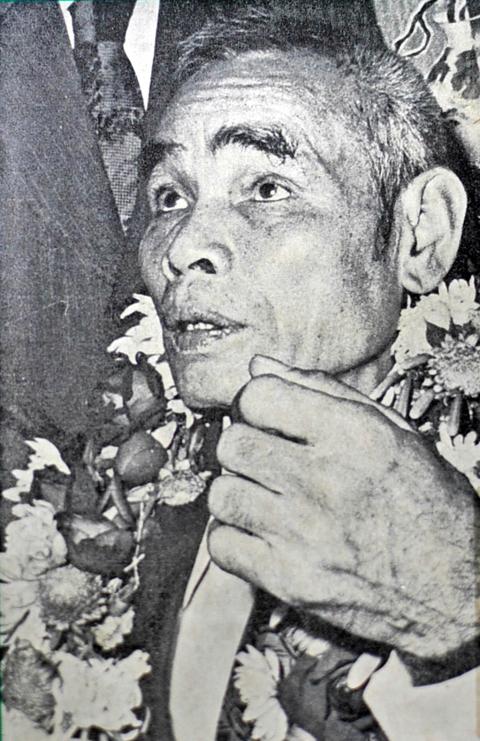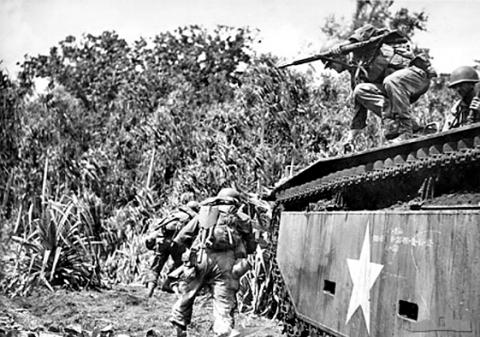Taiwan in Time: Jan. 4 to Jan. 10
On Jan. 8, 1975, nearly 30 years after the end of World War II, former Imperial Japanese Army soldier Nakamura Teruo finally returned home.
It was a different place from what he had known. His native land was no longer part of Japan. His son, who was an infant when he left, was now a father of four children, and his wife had remarried. Everyone was calling him Lee Kuang-hui (李光輝) — a name he had never even heard of when he departed for Indonesia with the Takasago Volunteer Unit in 1944.

Photo: Wikimedia Commons
A member of the Amis people, Western reports have his Aboriginal name as Attun Palalin, while local sources call him Suniuo, which is what this article will go with.
Even though the Takasago were a volunteer army in name, Suniuo says he was forced to enlist. Shortly after he landed on Morotai Island in Indonesia, the Allies arrived and secured it as a base. Suniuo lost contact with his group during this time.
Armed with an assault rifle, a helmet, knife, cooking pot and a mirror, Suniuo built a hut and remained in the jungle alone, surviving by hunting and farming. He did not know that the war had already ended, as the Japanese army declared him dead on Nov. 13, 1944.

Photo: Wikimedia Commons
Unsure of the situation outside of the jungle, Suniuo stayed hidden at all costs, cooking only in the dark so people wouldn’t see the smoke. In a first-hand account published shortly after his return titled Struggle in the Jungle for 30 Years (叢林掙扎三 十年), Suniuo recalls counting the days by the moon and recording each cycle by tying a knot in a rope. He says his upbringing in the mountains in relative poverty provided him the will and ability to survive for so long.
“I calmly stayed alive there,” he says. “Although I didn’t have anybody to talk to, buried deep in my heart seemed to be a glimmer of hope and expectation. The only trace of happiness during this time came from the fact that I was still alive and I hadn’t lost my sense of existence yet.”
As Suniuo’s only clothes deteriorated over time, he says he became used to being naked most of the time, only using a US Army jacket he found to cover himself at night.
Most of his time was devoted to finding food, he says. He grew sweet potatoes, beans, bananas and sugar cane in his garden, gathered roots and fruits and trapped boar, pheasant and other birds.
“Not to lose my life became my only goal, and that exhausted almost all of my time,” he says.
The only two forms of entertainment he had was fishing and fiddling with a home-made abacus. In order to keep himself from thinking of his family at home, he stayed busy exploring his surroundings and undertaking various improvement projects around his hut.
Suniuo says he made a grave error in assuming that war wasn’t over from the planes that flew by above him each day, only later to find out that it was because the jungle was near an Indonesian air force base. As aviation technology improved over time, planes became faster and sleeker, and Suniuo thought it was the result of an arms race between the two warring sides.
“I made one simple wrong judgment, and it cost me 30 years,” he says.
In November 1974, local reports surfaced of a “naked wild man” in the mountains, prompting the Indonesian army to send an expedition force, which, after 30 hours, found Suniuo chopping wood outside his hut.
This brought up the question of whether he should be repatriated to Japan or Taiwan. Suniuo was given the choice, and he chose his homeland.
According to this biography, his back pay as a soldier over 30 years only amounted to about NT$7,000. But after some commotion in the media, the Japanese government decided to give him over NT$380,000 instead. He later received various donations from Japanese, Indonesian and local sources.
Yet, a return after so long has to be bittersweet. His parents were dead, and only two siblings survived — all going by Chinese names now. Suniuo’s wife’s new husband (of more than 10 years) was originally willing to move out and let the couple reunite, but Suniuo decided not to disturb their life and bought an apartment nearby. Just four years after his return, he died of lung cancer.
Taiwan in Time, a column about Taiwan’s history that is published every Sunday, spotlights important or interesting events around the nation that have anniversaries this week.

Dissident artist Ai Weiwei’s (艾未未) famous return to the People’s Republic of China (PRC) has been overshadowed by the astonishing news of the latest arrests of senior military figures for “corruption,” but it is an interesting piece of news in its own right, though more for what Ai does not understand than for what he does. Ai simply lacks the reflective understanding that the loneliness and isolation he imagines are “European” are simply the joys of life as an expat. That goes both ways: “I love Taiwan!” say many still wet-behind-the-ears expats here, not realizing what they love is being an

William Liu (劉家君) moved to Kaohsiung from Nantou to live with his boyfriend Reg Hong (洪嘉佑). “In Nantou, people do not support gay rights at all and never even talk about it. Living here made me optimistic and made me realize how much I can express myself,” Liu tells the Taipei Times. Hong and his friend Cony Hsieh (謝昀希) are both active in several LGBT groups and organizations in Kaohsiung. They were among the people behind the city’s 16th Pride event in November last year, which gathered over 35,000 people. Along with others, they clearly see Kaohsiung as the nexus of LGBT rights.

In the American west, “it is said, water flows upwards towards money,” wrote Marc Reisner in one of the most compelling books on public policy ever written, Cadillac Desert. As Americans failed to overcome the West’s water scarcity with hard work and private capital, the Federal government came to the rescue. As Reisner describes: “the American West quietly became the first and most durable example of the modern welfare state.” In Taiwan, the money toward which water flows upwards is the high tech industry, particularly the chip powerhouse Taiwan Semiconductor Manufacturing Co (TSMC, 台積電). Typically articles on TSMC’s water demand

Every now and then, even hardcore hikers like to sleep in, leave the heavy gear at home and just enjoy a relaxed half-day stroll in the mountains: no cold, no steep uphills, no pressure to walk a certain distance in a day. In the winter, the mild climate and lower elevations of the forests in Taiwan’s far south offer a number of easy escapes like this. A prime example is the river above Mudan Reservoir (牡丹水庫): with shallow water, gentle current, abundant wildlife and a complete lack of tourists, this walk is accessible to nearly everyone but still feels quite remote.